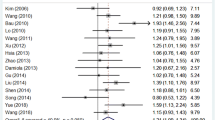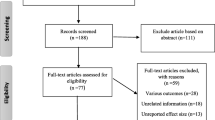Abstract
To date, epidemiological studies have assessed the association between Ataxia-telangiectasia mutated (ATM) gene polymorphisms and cancer risk, including lung cancer, breast cancer, glioma and pancreatic cancer. However, the results of these studies remain controversial. We aimed to examine the associations between two SNPs (rs664143 and rs664677) and cancer risk by conducting a meta-analysis of case–control studies. A total of 12 publications were included in this meta-analysis, 8 for rs664143 and 7 for rs664677. Overall, rs664143 heterozygote carriers turned out to be associated with cancer risk (OR = 1.18, 95% CI 1.02–1.36). In the subgroup analysis by cancer type, we observed that the ATM rs664143 polymorphism was significantly associated with lung cancer risk (GA vs. GG: OR = 1.48, 95% CI 1.18–1.85, AA vs. GG: OR = 1.51, 95% CI 1.18–1.93) and rs664677 polymorphism was associated with decreased lung cancr risk and increased breast cancer risk (for lung cancer: TC vs. TT: OR = 0.76, 95% CI 0.62–0.92, CC vs. TT: OR = 0.80, 95% CI 0.64–0.99 and for breast cancer: TC vs. TT: OR = 1.42, 95% CI 1.17–1.73, CC vs. TT: OR = 1.51, 95% CI 1.21–1.87). In the subgroup analysis by region, we also observed that individuals with ATM rs664143 GA or AA genotype had an obvious increased cancer risk among Asian people (GA vs. GG: OR = 1.40, 95% CI 1.20–1.63, AA vs. GG: OR = 1.37, 95% CI 1.16–1.62). In conclusion, ATM rs664143 polymorphism was associated with cancer susceptibility. ATM rs664143 polymorphism was significantly associated with lung cancer risk. ATM rs664677 polymorphism was associated with decreased lung cancer risk as well as increased breast cancer risk.



Similar content being viewed by others
References
Rotman G, Shiloh Y (1998) ATM: from gene to function. Hum Mol Genet 7:1555–1563
Savitsky K, Platzer M, Uziel T et al (1997) Ataxia-telangiectasia: structural diversity of untranslated sequences suggests complex post-transcriptional regulation of ATM gene expression. Nucleic Acids Res 25:1678–1684
Rasio D, Negrini M, Croce CM (1995) Genomic organization of the ATM locus involved in ataxia-telangiectasia. Cancer Res 55:6053–6057
Kastan MB, Derheimer FA (2010) Multiple roles of ATM in monitoring and maintaining DNA integrity. FEBS Lett 584:3675–3681
Tomita M (2010) Involvement of DNA-PK and ATM in radiation- and heat-induced DNA damage recognition and apoptotic cell death. J Radiat Res 51:493–501
Lavin MF, Kozlov S (2007) ATM activation and DNA damage response. Cell Cycle 6:931–942
Hall J, Angele S (2000) The ATM gene and breast cancer: is it really a risk factor? Mutat Res-Rev Mutat Res 462:167–178
Abraham RT (2003) Checkpoint signaling: epigenetic events sound the DNA strand-breaks alarm to the ATM protein kinase. Bioessays 25:627–630
Hsiung CA, Lo YL, Hsiao CF et al (2010) ATM polymorphisms and risk of lung cancer among never smokers. Lung Cancer 69:148–154
Wu XF, Yang HS, Spitz MR et al (2007) ATM sequence variants associate with susceptibility to non-small cell lung cancer. Int J Cancer 121:2254–2259
Xia W, Su D, Liu P et al (2010) Single nucleotide polymorphism in ATM and non-small cell lung cancer susceptibility. China Oncol 20:121–124
Brennan P, Landi S, Gemignani F et al (2006) DNA repair and cell cycle control genes and the risk of young-onset lung cancer. Cancer Res 66:11062–11069
Deng Q, Sheng L, Su D et al (2010) Genetic polymorphisms in Atm, Ercc1, Ape1 and Iaspp genes and lung cancer risk in a population of southeast China. J Thorac Oncol 5:S51–S51
Hong YC, Kim JH, Kim H et al (2006) Genetic polymorphisms of ataxia telangiectasia mutated affect lung cancer risk. Hum Mol Genet 15:1181–1186
Angèle S, Romestaing P, Moullan N et al (2003) ATM haplotypes and cellular response to DNA damage: association with breast cancer risk and clinical radiosensitivity. Cancer Res 63:8717–8725
Tamimi RM, Hankinson SE, Spiegelman D et al (2004) Common ataxia telangiectasia mutated haplotypes and risk of breast cancer: a nested case–control study. Breast Cancer Res 6:R416–R422
Kang DH, Lee KM, Choi JY et al (2005) Genetic polymorphisms of ataxia telangiectasia mutated and breast cancer risk. Cancer Epidemiol Biomarkers Prev 14:821–825
Zheng W, Ye CZ, Dai Q et al (2007) Two-stage case–control study of common ATM gene variants in relation to breast cancer risk. Breast Cancer Res Treat 106:121–126
Lee SA, Lee KM, Lee SJ et al (2010) Antioxidant vitamins intake, ataxia telangiectasia mutated (ATM) genetic polymorphisms, and breast cancer risk. Nutr Cancer-Int J 62:1087–1094
Malmer BS, Feychting M, Loenn S et al (2007) Genetic variation in p53 and ATM haplotypes and risk of glioma and meningioma. J Neurooncol 82:229–237
Einarsdottir K, Humphreys K, Bonnard C et al (2007) Effect of ATM, CHEK2 and ERBB2 TAGSNPs and haplotypes on endometrial cancer risk. Hum Mol Genet 16:154–164
Li DH, Suzuki H, Liu BR et al (2009) DNA repair gene polymorphisms and risk of pancreatic cancer. Clin Cancer Res 15:740–746
Bassing CH, Yin B, Savic V (2007) ATM prevents unattended DNA double strand breaks on site and in generations to come. Cancer Biol Ther 6:1837–1839
Tauchi H, Iijima K, Ohara M et al (2008) Dancing on damaged chromatin: functions of ATM and the RAD50/MRE11/NBS1 complex in cellular responses to DNA damage. J Radiat Res 49:451–464
Luo Y, Lin FT, Lin WC (2004) ATM-mediated stabilization of hMutL DNA mismatch repair proteins augments p53 activation during DNA damage. Mol Cell Biol 24:6430–6444
Kastan MB, Lim DS (2000) The many substrates and functions of ATM. Nat Rev Mol Cell Biol 1:179–186
Khanna KK (2000) Cancer risk and the ATM gene: a continuing debate. J Natl Cancer Inst 92:795–802
Gao Y, Hayes RB, Huang WY et al (2011) DNA repair gene polymorphisms and tobacco smoking in the risk for colorectal adenomas. Carcinogenesis 32:882–887
Acknowledgments
This study was supported by grants No. LS2010168 from Liaoning Provincial Department of Education, and grant No. 00726 from China Medical Board. The authors are most grateful to all the participants in this study.
Author information
Authors and Affiliations
Corresponding author
Rights and permissions
About this article
Cite this article
Shen, L., Yin, ZH., Wan, Y. et al. Association between ATM polymorphisms and cancer risk: a meta-analysis. Mol Biol Rep 39, 5719–5725 (2012). https://doi.org/10.1007/s11033-011-1381-2
Received:
Accepted:
Published:
Issue Date:
DOI: https://doi.org/10.1007/s11033-011-1381-2




